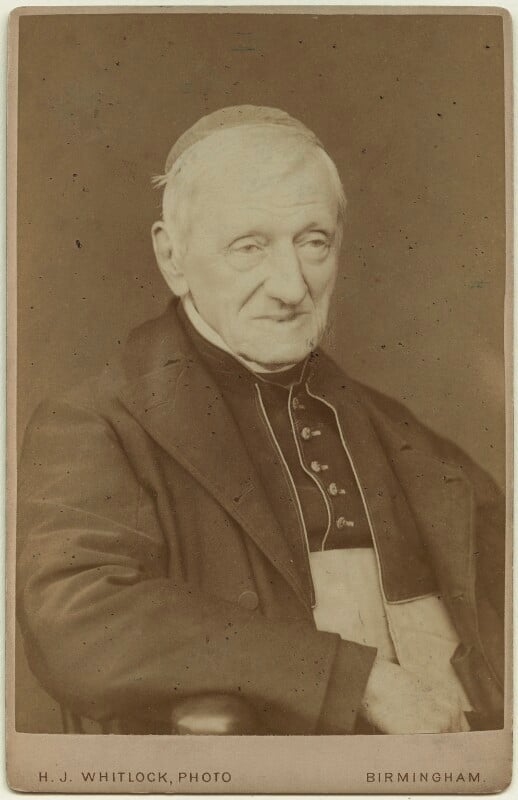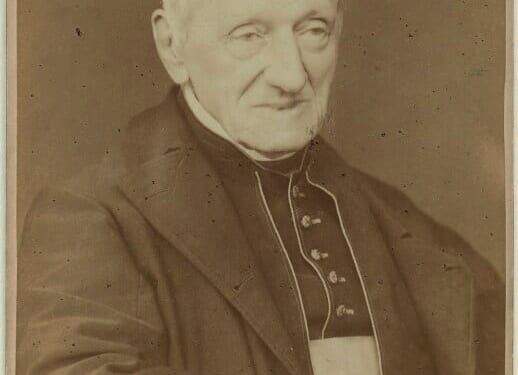St. John Henry Newman, at age fifteen, embarked on a decades-long journey: in the words of his motto, ex imaginibus et umbris in veritatem (“From images and shadows into the truth”). For many years on his theological sojourn, Newman stood by the teaching of the 39 Articles of Religion of the Anglican Communion, including the one that describes Purgatory as a “pernicious” doctrine. With much prayer, intense study of the whole thrust of Sacred Scripture, as well as the convincing witness of the Fathers of the Church, he ended up writing one of the finest works on Purgatory, “The Dream of Gerontius,” which rivals the depth and beauty of Dante’s appreciation of Purgatory in his Divina Commedia; perhaps this work is best known through the lovely hymn, “Praise to the Holiest,” which Pope Benedict XVI quoted in his homily at Newman’s beatification.
In Newman’s poem, a soul is in its last agony and is trying to make sense of his final moments, assisted by his Guardian Angel. The dying man cannot understand why he has become so calm in the face of this previously dreaded experience; the angel tells him that the prayers of the priest and his friends who surround him have given him confidence and, further, that the “calm and joy uprising in thy soul is first-fruit to thee of thy recompense, and Heaven begun.”
The man gradually slips more and more and becomes concerned about the loss of his senses; the Angel comforts him: “till that Beatific Vision, thou art blind; for e’en thy Purgatory, which comes like fire, is fire without its light.”
The soul is buoyed up by that knowledge and conforms his will to God’s, asking but to see the Face of God for no more than a moment before embarking on his process of purification. The Angel declares that he shall, in fact, see God for just such a twinkling of an eye, but warns him: “That sight of the Most Fair will gladden thee, but it will pierce thee too.”
This soul will now “learn that the flame of Everlasting Love doth burn ’ere it transform.” He is now ready to face the Lord in judgment, the sight of whom “will kindle in thy heart all tender, gracious, reverential thoughts.”
And what might such thoughts be? Best to allow the poetic genius of Newman to speak directly for, as he knew, cor ad cor loquitur (his cardinalitial motto: “Heart speaks to heart”):
Thou wilt be sick with love, and yearns for Him
And feel as though thou couldst but pity Him,
That one so sweet should e’er have placed Himself
At disadvantage such, as to be used
So vilely by a being so vile as thee.
There is a pleading in His pensive eyes
Will pierce thee to the quick, and trouble thee.
And thou wilt hate and loathe thyself; for, though
Now sinless, thou wilt feel that thou hast sinn’d,
As never thou didst feel; and wilt desire
To slink away, and hide thee from His sight:
And yet wilt have a longing aye to dwell
Within the beauty of His countenance.
And these two pains, so counter and so keen, –
The longing for Him, when thou seest Him not;
The shame of self at thought of seeing Him, –
Will be thy veriest, sharpest Purgatory.
As the man proceeds to the divine tribunal, he is astonished to hear earthly voices; once more, he is reminded that he hears the priest and his friends praying the Subvenite (“Come to their aid, ye saints of God”) on his behalf, bringing now the same Angel of the Agony who strengthened Christ in His final hours to do the same for this poor soul, escorting him into eternity.

Once there, this would-be lover of God “flies to the dear feet of Emmanuel” but never fully makes it because the sanctity of the All-Holy One scorches and shrivels the soul into passivity “before the awful Throne.” And yet, the Angel can exclaim: “O happy, suffering soul! For it is safe, consumed, yet quicken’d, by the glance of God.”
And the soul agrees; he is, paradoxically, “happy in my pain” and even wants to leave the presence of God immediately, so as to hasten the day when he can return for the full and lasting experience, desiring to rush forth to what the Angel terms “the golden prison” of Purgatory. The man confidently asserts: “There will I sing my absent Lord and Love: – Take me away, that sooner I may rise, and go above, and see Him in the truth of everlasting day.”
And so, the soul’s Angel complies with those holy wishes. Let’s listen to how Newman ends this magnificent work, which is at once imaginative and theological, realistic and poetic, as he gives God’s messenger the final say:
Softly and gently, dearly-ransom’d soul,
In my most loving arms I now enfold thee,
And, o’er the penal waters, as they roll,
I poise thee, and I lower thee, and hold thee.
And carefully I dip thee in the lake,
And thou, without a sob or a resistance,
Dost through the flood thy rapid passage take,
Sinking deep, deeper, into the dim distance.
Angels, to whom the willing task is given.
Shall tend, and nurse, and lull thee, as thou liest;
And Masses on the earth, and prayers in Heaven,
Shall aid thee at the Throne of the Most Highest.
Farewell, but not for ever! Brother dear,
Be brave and patient on thy bed of sorrow;
Swiftly shall pass thy night of trial here,
And I will come and wake thee on the morrow.
All Souls’ Day, then, brings together many crucial themes of Christian theology: divine justice and mercy; human responsibility and dignity; solidarity in prayer and suffering; life now viewed from the perspective of eternity, in a Church and a Lord which gather us up into that Mystical Body of His, truly a Communion of Saints whose bonds are not broken by death but actually fortified.
And so, who among us could not be hopeful and joyful before such great and consoling truths? And the sobriety of the day’s liturgy is like the instant of Purgatory itself – a fitting prelude to the glory of a thousand times a thousand years of possessing Love and being possessed by Him forever.
Yes, Lord, we pray today for all who love and yearn for Your purifying love; make them – and us – to be cum sanctis tuis in aeternum, quia pius es (“With thy saints forever, for Thou art merciful”)!
Let’s give Cardinal Newman himself the last word by having recourse to two of his more beautiful prayers:
May He support us all the day long, till the shadows lengthen, and the evening comes, and the busy world is hushed, and the fever of life is over, and our work is done. Then in His mercy, may He give us a safe lodging, and a holy rest, and peace at the last.
And this:
Oh, my Lord and Saviour, support me in that hour in the strong arms of Thy Sacraments, and by the fresh fragrance of Thy consolations. Let the absolving words be said over me, and the holy oil sign and seal me, and Thy own Body be my food, and Thy Blood my sprinkling; and let my sweet Mother, Mary, breathe on me, and my Angel whisper peace to me, and my glorious Saints. . .smile upon me; that in them all, and through them all, I may receive the gift of perseverance, and die, as I desire to live, in Thy faith, in Thy Church, in Thy service, and in Thy love. Amen.











